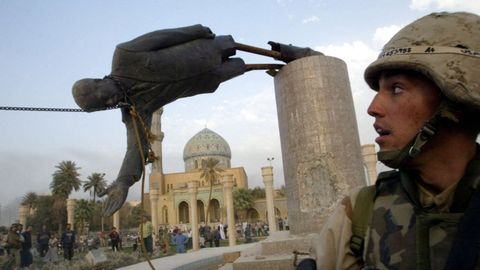
A soldier watches as a statue of Saddam Hussein falls in Baghdad in April 2003. GORAN TOMAŠEVIĆ | Reuters
The invasion, based on false evidence and declared “illegal” by the UN, exposed the fragility of international law
In the early 2000s, the world was a different place. In the United States, then a country traumatized by the attacks of September 11, 2001, a bipartisan consensus justified launching preemptive invasions to avoid potential threats. So, one year after the attack on the Twin Towers, Congress passed a resolution authorizing it Sending US troops to Iraq with a majority of 77% in the Senate and 68% in the House of Representatives. So neither China nor Russia were part of it President George W. Bush’s Axis of Evil.
In a speech that will end up under the harsh judgment of history, on February 5, 2003. Colin Powell, the US Secretary of State at the time, appeared before the UN and stated that the information he presented was “supported by solid sources” and that it was “facts” and not “assumptions”. Powell offered a methodical review of the intelligence he claimed showed Iraq possessed weapons of mass destruction and that the dictator Saddam Hussein was connected to the terrorist organization Al Qaeda.
Powell lied to the UN and the organization’s legitimacy was never the same. In vain, in 2004, the then Secretary General of the United Nations, Kofi Annan, decisively declared that “from the point of view of the Charter of the United Nations”, the war in Iraq was “illegal”.
Two years after Powell’s speech, the CIA itself had to admit this no stockpiles of nuclear, chemical or biological weapons have ever been found in Iraq. By then, American soldiers were already encamped on Iraqi soil, and it would take the country almost twenty years to achieve relative stability.
The legacy of post-truth
Two decades later, when the first major European war after World War II took place, the echoes of that primal post-truth still reverberate. The invasion of Iraq showed that, in an order supposedly based on international law, some powers can defend the international system with words and attack it with deeds. A legacy that can be traced to the criticism that dictators and demagogues level at Washington today. The Iraqi example stands behind the arguments presented by Russia in Syria, Georgia and Crimea, and China in Taiwan and in connection with the genocide against the Uyghurs. The dust of the Iraqi desert can be found in the mud of the Ukrainian black earth.
If basing the invasion of Iraq on deception was the first mistake of the international coalition, the second was failing to heed Colin Powell’s warning to George Bush that removing the dictator was “the easy part.”
From 2003 to 2011 — when US troops left the country, ending the war actually— the occupying forces failed to create the preconditions for a stable state and the experiment failed: the fight against the rebellion, fueled by the crisis in neighboring Syria, ended up escalating into a national armed conflict that could not be closed until 2017.
In 2023, two decades after the start of the war, more than 2,500 operatives of the US armed forces continue to work in Iraq, in theory, advising and assisting their Iraqi and Kurdish counterparts. Last week, the United States Senate passed a resolution that, if it successfully completes its way through the US legislative process, would repeal the 2002 resolution that authorized military intervention in Iraq.
a future with hope
Iraq, for its part, is looking to the future with hope for the first time in twenty years. Gone is the regime of Saddam Hussein and the insurgency of the second decade of the 2000s, in which the Islamic State — largely fed by soldiers from the Iraqi army disbanded by an international coalition in 2003 — reached its peak.
In 2021, the country introduced electoral legislation that recognized the demands for representation expressed in popular protests in 2018. EU observers gave the green light for elections that were “technically well organized, competitive” and that “allowed voters to freely express their will.
Source: La Vozde Galicia
I am Amelia James, a passionate journalist with a deep-rooted interest in current affairs. I have more than five years of experience in the media industry, working both as an author and editor for 24 Instant News. My main focus lies in international news, particularly regional conflicts and political issues around the world.







